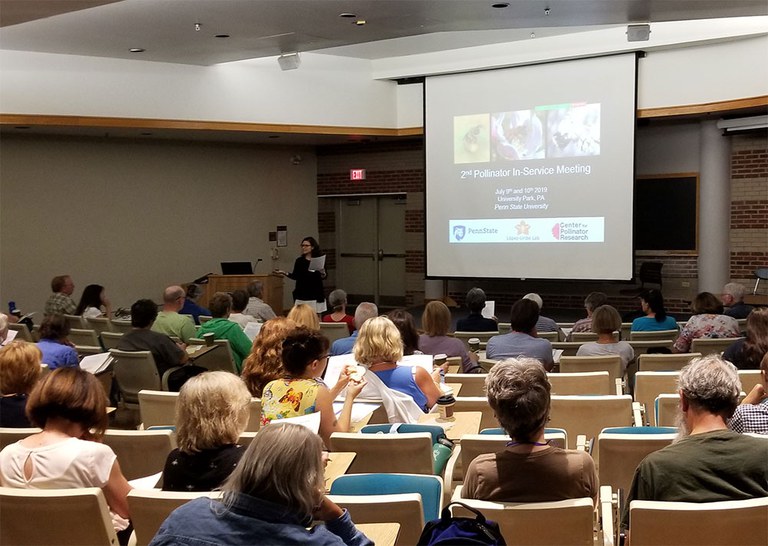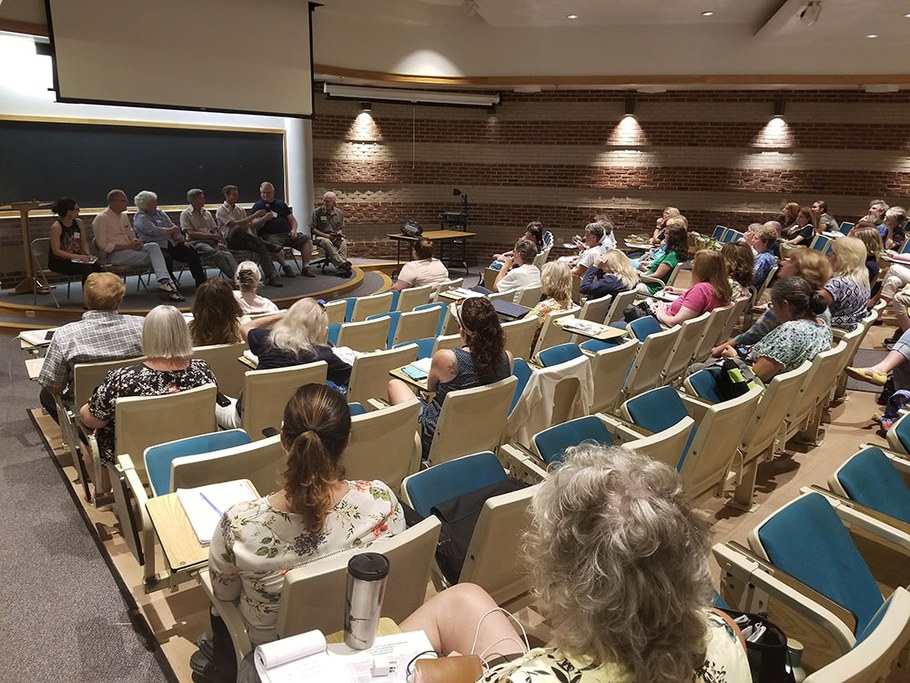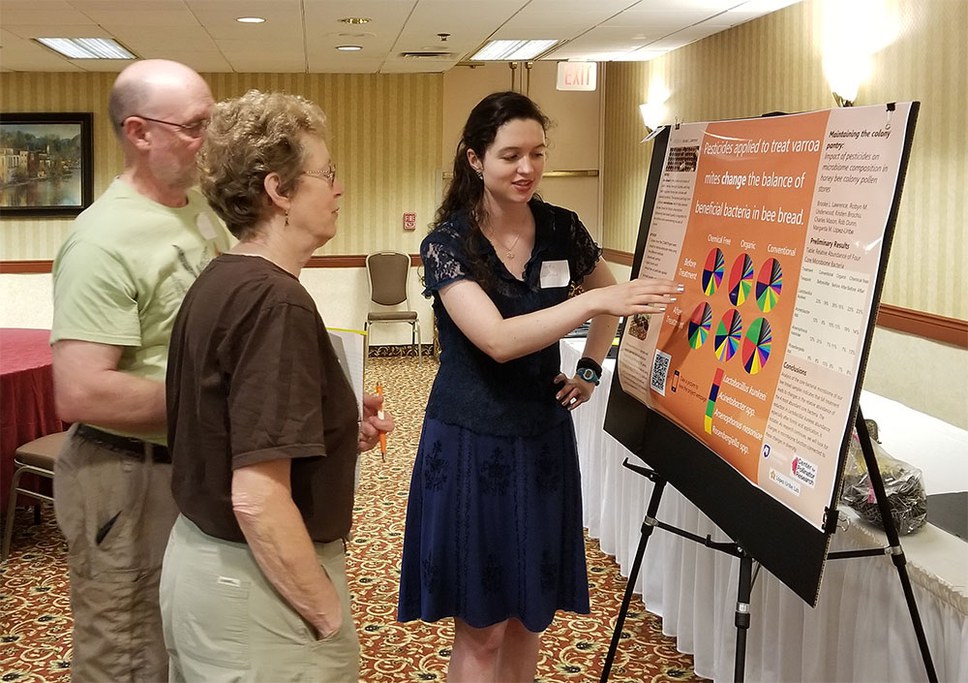Posted: August 1, 2019
Penn State Extension and the Center for Pollinator Research hosted a two-day in-service meeting in July 2019 to train Extension Educators and Master Gardeners on the latest information about pollinator diversity, health, and management.

Margarita López-Uribe welcomes 100+ attendees to the 2nd Pollinator In-service Meeting at Penn State on July 9th, 2019. Photo by Shelby Kilpatrick.
Over 100 individuals from across Pennsylvania joined the workshop, to learn about the 450+ species of bees in Pennsylvania that pollinate our crops and maintain ecosystems. Pennsylvania has one of the most diverse, pollinator-dependent cropping systems in the United States, as outlined in the Pennsylvania Pollinator Protection Plan (P4).
The number of attendees in 2019 doubled from the first time the Pollinator In-service Meeting was held in 2014. Margarita López-Uribe, Assistant Professor of Entomology at Penn State and co-coordinator of the event, said "It is very motivating to see the substantial increase in interest on the topic of pollinators and in supporting their populations. I was shocked to see how much information has been generated in the past few years, and how much more new content we are able to share during these meetings."
Presentations at the Meeting were provided from experts from seven institutions: Penn State University - University Park, Penn State University - Altoona, United States Department of Agriculture - Agricultural Research Service (USDA-ARS) - Logan, UT, Michigan State University, North Carolina State University, Cornell University, and the Natural Resources Conservation Service (NRCS). Over two days, they presented on pollination ecology, bee identification, integrated crop pollination, pollinator habitat implementation and conservation strategies, and how stressors including pesticides, nutrition, and pathogens affect pollinators.

Panel discussion on the status of pollinators and bees, including factors that stress their populations. From left to right, Margarita López-Uribe, Harland Patch, Diana Cox-Foster, Jim Cane, Scott McArt, David Biddinger, and Shelby Flesicher. Photo by Shelby Kilpatrick.
For Cathy Campbell, a Franklin County Master Gardener, one highlight of the Meeting was the Penn State graduate student poster session. "These students are [a] life-affirming hope for the future; our future is assisted by pollinators - [our lives are] very intertwined," she said.
The poster session was an opportunity not only for the participants to learn about the students' ongoing projects and their future applications, but for the students who shared their work as well.
Allyson Ray, a Ph.D. student in the Grozinger and Rasgon Labs who presented the results of her research during the student poster session, commented that "compared to other poster sessions I have attended, never before had I received such genuine interest and enthusiasm for my work. Research presentations always seem to reinvigorate my research spirit, and this one was no different, and in fact, the positive receptivity of the audience inspired me even more than perhaps any other poster session."
"I found it valuable to present to a different audience and talk with Master Gardeners," said Chauncy Hinshaw, a Ph.D. student in the Rosa and López-Uribe Labs. "It helped me learn how to explain my research to an audience not as familiar with honey bees or viruses, and to learn about pollinator-friendly plants!" Hinshaw hopes "that participants were able to understand the importance of studying feral honey bees and feel encouraged to contribute to our ongoing study."
Brooke Lawrence, a MS Student in the López-Uribe Lab, said that a highlight of the event was "getting to meet the invited speakers and hear about the different aspects of current pollinator research. I was exposed to some research elements I had not yet heard of." Lawrence also had the opportunity to meet a former high school science teacher during the event. "Since this is my ultimate career goal, it was great to share my work with her and discuss how my current work might one day contribute to my teaching as well as research."

Brooke Lawrence presents her research poster titled "Maintaining The Colony Pantry: Impact Of Pesticides On Microbiome-Mediated Pollen Preservation In Honey Bee Colonies" to participants at the 2nd Pollinator In-service Meeting. Photo by Shelby Kilpatrick.
The In-service allowed opportunities for networking, not only between researchers, but also between participants who work in different counties and may not otherwise interact.
Consuelo Almodovan, a Lehigh/Northampton County Master Gardener, said that her favorite parts of the Meeting were "networking with diverse individuals [who share] common interests" and "always learning something new."
López-Uribe said that the Meeting was designed to provide attendees with "updated high-quality scientific information from experts in these fields," she said, "the hope is that we are training the trainers and that participants will help disseminate the information to others in their counties."
Many of the Master Gardeners who participated stated that they planned to use the details from sessions in their own presentations and workshops, as well as to improve both home and demonstration garden plantings for pollinators. "Wild bees are extremely important pollinators," said Kevin Hoover, a Centre County Master Gardener. "[We should] plant a wide variety of flowers and trees that bloom throughout the season to support them."
Joyce Long, Coordinator of the Cambria County Master Gardener Program, said "I would encourage other Master Gardeners to attend the In-service in the future. Even though a lot of it was beyond the level of education I've received so far, I started to realize I was understanding more as the event went on and I will be able to relay a lot of the information to others in the future."
The 2019 Pollinator In-service Meeting was sponsored by a multistate grant through Penn State Extension and held at the Agricultural Sciences and Industries Building on Penn State's University Park campus.
For more information on upcoming pollinator events, including future in-service programs, please visit the Center for Pollinator Research website.
- Shelby Kerrin Kilpatrick

